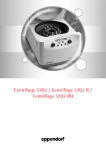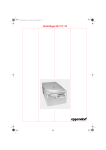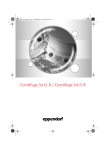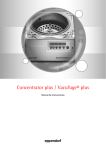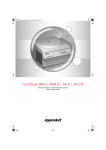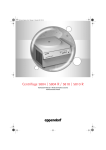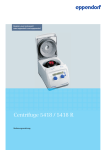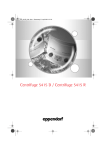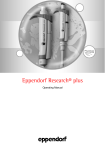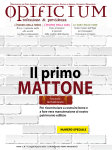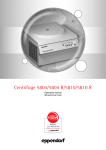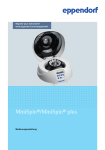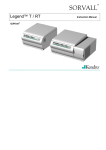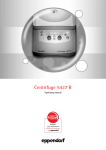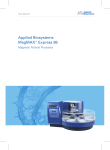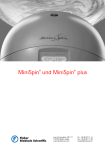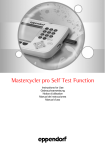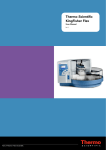Download Eppendorf Centrifuge 5424 - biovendis
Transcript
Titel_5424_de.fm Seite 1 Donnerstag, 3. Mai 2007 9:42 09 Centrifuge 5424 Klapps_5424.fm Seite 2 Donnerstag, 3. Mai 2007 9:42 09 Centrifuge 5424 Table of contents Inhaltsverzeichnis . . . . . . . . . . . . . . . . . . . . . . . . . . . . . . . . . . . . . . . . . . . . . . . . . . . 5 Instruction Manual . . . . . . . . . . . . . . . . . . . . . . . . . . . . . . . . . . . . . . . . . . . . . . . . . . 27 Notice abrégée . . . . . . . . . . . . . . . . . . . . . . . . . . . . . . . . . . . . . . . . . . . . . . . . . . . . 49 Istruzioni in breve . . . . . . . . . . . . . . . . . . . . . . . . . . . . . . . . . . . . . . . . . . . . . . . . . . 58 Instrucciones breves . . . . . . . . . . . . . . . . . . . . . . . . . . . . . . . . . . . . . . . . . . . . . . . . 67 Beknopte handleiding . . . . . . . . . . . . . . . . . . . . . . . . . . . . . . . . . . . . . . . . . . . . . . . 76 Kort vejledning. . . . . . . . . . . . . . . . . . . . . . . . . . . . . . . . . . . . . . . . . . . . . . . . . . . . . 85 Kort handledning . . . . . . . . . . . . . . . . . . . . . . . . . . . . . . . . . . . . . . . . . . . . . . . . . . . 94 Pikaohje . . . . . . . . . . . . . . . . . . . . . . . . . . . . . . . . . . . . . . . . . . . . . . . . . . . . . . . . . 103 Manual abreviado . . . . . . . . . . . . . . . . . . . . . . . . . . . . . . . . . . . . . . . . . . . . . . . . . 111 Συνοπτικές οδηγίες . . . . . . . . . . . . . . . . . . . . . . . . . . . . . . . . . . . . . . . . . . . . . . . . 120 No part of this publication may be reproduced without the prior permission of the copyright owner. Copyright© 2005 Eppendorf AG, Hamburg 2 Klapps_5424.fm Seite 3 Donnerstag, 3. Mai 2007 9:42 09 Centrifuge 5424 Figure 1 / Abbildung 1 Figure 1 / Abbildung 1 1 2 4 3 open short start/stop speed E menu/enter Arrow button rpm/rcf time menu/enter Arrow button rpm/rcf time speed open short start/stop 1 2 3 4 E 3 menu/enter button Arrow button rpm/rcf button Time arrow buttons Speed arrow buttons Lid release button Short run button Start/stop button Power plug Power switch Rotor nut Rotor Emergency lid release menu/enter-Taste Pfeiltaste rpm/rcf-Taste Zeitwahl-Pfeiltasten Geschwindigkeits-Pfeiltasten Deckelentriegelungs-Taste Kurzzeitlauf-Taste Start/Stop-Taste Netzstecker Netzschalter Rotormutter Rotor Notentriegelung Klapps_5424.fm Seite 4 Donnerstag, 3. Mai 2007 9:42 09 Centrifuge 5424 Figure 2 / Abbildung 2 Figure 2 / Abbildung 2 1 2 4 3 open short start/stop speed E menu/enter Arrow button rpm/rcf time menu/enter Arrow button rpm/rcf time speed open short start/stop 1 2 3 4 E 4 menu/enter button Arrow button rpm/rcf button Time knob Speed selector knob Lid release button Short run button Start/stop button Power plug Power switch Rotor nut Rotor Emergency lid release menu/enter-Taste Pfeiltaste rpm/rcf-Taste Zeitwahl-Drehknopf Geschwindigkeits-Drehknopf Deckelentriegelungs-Taste Kurzzeitlauf-Taste Start/Stop-Taste Netzstecker Netzschalter Rotormutter Rotor Notentriegelung 02_5424_050503_en.fm Seite 27 Donnerstag, 3. Mai 2007 9:45 09 Table of contents Introduction ................................................................................................................28 Delivery package .........................................................................................................28 Installing the device .....................................................................................................28 2 Safety precautions and applicational limitations....................................................30 3 3.1 3.2 3.3 3.4 3.5 3.6 3.7 3.8 3.9 3.10 3.11 3.12 3.13 3.14 3.15 3.16 3.17 3.18 Operation ....................................................................................................................33 Functional and operator control elements...................................................................33 Menu structure.............................................................................................................34 Fitting and removing the rotors ...................................................................................34 Loading the rotors .......................................................................................................34 Rotors ..........................................................................................................................34 Centrifugation with timer setting..................................................................................35 Adjusting centrifuging parameters during centrifugation ............................................35 Short spin centrifugation .............................................................................................36 Continuous operation ..................................................................................................36 rcf display and calculation ...........................................................................................37 Setting startup and braking ramp................................................................................38 Run start ......................................................................................................................38 Permanent setting of parameters ................................................................................39 Activating and deactivating the loudspeaker ..............................................................39 Volume control.............................................................................................................40 Standby mode .............................................................................................................40 Opening the centrifuge in case of power failure..........................................................41 Fuses ...........................................................................................................................41 4 4.1 4.2 4.3 4.4 Maintenance and cleaning........................................................................................42 Device ..........................................................................................................................42 Rotors ..........................................................................................................................42 Glass breakage ............................................................................................................43 Returning devices ........................................................................................................43 5 Troubleshooting ........................................................................................................44 6 Technical data............................................................................................................45 7 Ordering information .................................................................................................46 Table of contents 1 1.1 1.2 27 02_5424_050503_en.fm Seite 28 Donnerstag, 3. Mai 2007 9:45 09 1 Introduction The Centrifuge 5424 is a non-refrigerated bench-top centrifuge. It is intended for sample preparation within the sphere of clinical diagnostics and in the routine, training and research laboratory in hospitals, science and industry. The devices may only be operated by trained specialist staff. The various fixed-angle rotors and adapters enable a large number of tubes like micro test tubes, PCR strips, Microtainers® and Spin Columns to be used. In the context of in vitro diagnostics, the Centrifuge 5424 is designed among other things for chromosome analysis of human cells by the FISH technique (Kievits et al. 1990). Introduction 1 Before using the centrifuge 5424 for the first time, please read the manual. The latest version of the manual and the safety instructions in your language can be found on the Internet at www.eppendorf.com. You will see this symbol on your centrifuge and at a number of points throughout this manual. The texts it highlights are relevant to safety. Use the centrifuge only when you have read these safety instructions. 1.1 Delivery package 1 Centrifuge 5424 1 Rotor FA-45-24-11 incl. rotor lid (only for order no. 5424 000.410, 5424 000.010, 5424 000.428, 5424 000.029, 022620428, 022620461, 022620401 and 022620444) 1 power cable 1 manual 1 rotor key 1 Captain Eppi rotor key holder 1 set of fuses 1.2 28 Installing the device – To disconnect the power supply of the centrifuge from the power supply in the event of a fault, an emergency switch must be provided away from the centrifuge, preferably outside the room in which the centrifuge is located or next to the exit from this room. – Remove the transport safety device and keep it together with the centrifuge packaging for possible use if the device is subsequently moved. – Place the centrifuge on a solid, flat, non-resonant lab bench. Check beforehand whether the lab bench is specified for the weight of the centrifuge. – The surrounding area must be well-ventilated and protected against direct sunlight. To ensure that ventilation of the device is not impaired, a minimum fundamental clearance of at least 30 cm to the side and at least 15 cm to the back wall must be maintained. – During centrifugation, according to the recommendations set out in EN 61010-2-020, a safety clearance of 30 cm must be maintained around the centrifuge within which there are no objects which may be destroyed and so cause further damage. – Please ascertain that the power supply and the power frequency are compatible with the information given on the device ID plate. 02_5424_050503_en.fm Seite 29 Donnerstag, 3. Mai 2007 9:45 09 1 Introduction – Now connect the centrifuge to the power supply and switch it on at the main power switch (see inside cover page). The centrifuge is now ready for operation and the display is active. – Before starting for the first time, check whether the rotor and the rotor lid are tightened in accordance with specification. To tighten the rotor, place the rotor key supplied on the rotor nut and turn it clockwise until the rotor nut is firmly tightened up. The rotor lid is then tightened up. 1 Introduction 29 02_5424_050503_en.fm Seite 30 Donnerstag, 3. Mai 2007 9:45 09 2 Safety precautions and applicational limitations – Safety precautions and applicational limitations 2 30 For your personal safety, please be sure to comply with the following regulations unconditionally. The centrifuge 5424 must only be used for the specified applications (see Section 1, “Introduction”). It must not be operated in explosive atmospheres. Explosive, radioactive or highly reactive substances must not be centrifuged. – When being moved from the cool room to a normal lab environment, the centrifuge must either run for half an hour in the cool room first to warm up, or it must warm up for at least 3 hours in the lab before being connected to the power supply system, in order to prevent damage from condensation. – The centrifuge must not be moved or knocked while in operation. – Centrifuges which have not been properly installed or repaired may not be operated. Repairs may only be carried out by Service personnel authorized by Eppendorf. Use only original Eppendorf spare parts and rotors. – When handling toxic liquids or pathogenic microorganisms of risk group II (see World Health Organization: Laboratory Biosafety Manual) comply with the relevant national regulations. Bioseals are a component of biosafety systems which are not capable, in isolation, of ensuring that people and the environment are protected when pathogenic microorganisms are being handled. When working with pathogenic microorganisms of a higher risk group, more than one aerosol-tight bioseal must be provided for. If the named liquids are spilled in the rotor or rotor chamber, the centrifuge must be thoroughly and professionally cleaned. Before using any cleaning or decontamination method other than that set out in Section 4, "Maintenance and cleaning", please consult Eppendorf to ensure the intended method will not damage the device. – Rotors and rotor lids must always be properly secured. The centrifuge may only be operated with the rotor and rotor lid firmly tightened. To do this, before centrifugation, place the rotor key supplied for tightening up the rotor on the rotor nut and turn it clockwise until the rotor nut is firmly tightened up. The rotor lid is then screwed on tightly (see Section 3.5 "Rotors" with regard to exceptions for rotors FA-45-24-11 and FA-45-24-11-Special for centrifuging micro test tubes with closed tube lids). If unusual noises occur when the centrifuge starts, the rotor or the rotor lid are not properly secure. In this case, stop centrifugation immediately using start/stop. – The rotor may only be loaded symmetrically. Opposing vessels should be of the same type and be filled equally. On each rotor you will find information about maximum load (adapter, tube and contents) per bore - this limit may not be exceeded. – Rotors showing clear signs of corrosion or mechanical damage must not be used. Check the accessories regularly. 02_5424_050503_en.fm Seite 31 Donnerstag, 3. Mai 2007 9:45 09 2 Safety precautions and applicational limitations – Rotors are high-grade components which have to withstand extreme stresses and strains. Aluminum rotors are surface-treated to provide them with a high level of protection from corrosion by the most common laboratory chemicals, though this protection is not unlimited. Avoid damage from the use of aggressive chemicals such as strong and weak alkalis, strong acids, solutions of mercury, copper and other heavy metal ions, chlorinated hydrocarbons, concentrated salt solutions and phenol. If the rotor is contaminated by aggressive substances, clean it immediately with a neutral agent (e.g. Extran® neutral, RBS® neutral or Teepol® 610 S). This applies to the rotor bores in particular. Rotors labeled "coated" are particularly resistant to chemicals. However, even on these rotors, this does not replace regular cleaning as described in Section 4 "Maintenance and cleaning". Protect the rotors from mechanical damage. Even minor scratches or cracks can result in serious internal material damage. If the rotor is run for a lengthy period or more often with short centrifugation runs, the sample tubes will become hot. – Keep within the load limits specified for the tubes by the tube manufacturer. Tubes may only be centrifuged at the preselected g-force (rcf) if they are approved for this application by the manufacturer. – Before centrifugation, all the tubes should be subjected to a visual inspection for material damage. Damaged tubes must not be centrifuged, as if tubes break, there may be further damage to the centrifuge and its accessories in addition to loss of the sample. – Tube lids must be sealed down tight before centrifuging. The lids of tubes which are not sealed may rip off during centrifugation and damage the rotor lid and the centrifuge. – When using organic solvents (e.g. phenol, chloroform), the durability of plastic tubes may be impaired with the result that tubes may break during centrifugation. – When closing the centrifuge lid, do not place your fingers between the lid and the centrifuge, otherwise they may be trapped. – The transparent rotor covers made from polypropylene have a maximum useful life of 3 years. The date of manufacture is impressed on them in the form of a watch . Rotors and rotor covers which have been damaged chemically or mechanically or which have passed their maximum useful life must no longer be used. 12 1 01 11 5 6 2 3 4 8 9 10 The material being centrifuged may not exceed a density of 1.2 g/ml at maximum speed. – Safety precautions and applicational limitations – 2 7 Declaration concerning the ATEX directive (94/9/EC) The present design and ambient conditions inside Eppendorf centrifuges mean that they are not suitable for use in a potentially explosive atmosphere. The centrifuges must therefore only be used in a safe environment such as the open environment of a ventilated laboratory or a fullyextracted fume hood. The use of substances which may contribute to a potentially explosive atmosphere is not permitted. The final decision on the risks in connection with the use of such substances is the responsibility of the user of the centrifuge. 31 02_5424_050503_en.fm Seite 32 Donnerstag, 3. Mai 2007 9:45 09 2 Safety precautions and applicational limitations Transfer If the device is passed on to someone else, please include the instruction manual. Disposal In case the product is to be disposed of, the relevant legal regulations are to be observed. 2 Safety precautions and applicational limitations Information on the disposal of electrical and electronic devices in the European Community The disposal of electrical devices is regulated within the European Community by national regulations based on EU Directive 2002/96/EC on waste electrical and electronic equipment (WEEE). According to these regulations, any devices supplied after 13.08.05 in the business-to-business sphere, to which this product is assigned, may no longer be disposed of in municipal or domestic waste. They are marked with the following symbol to indicate this. As disposal regulations within the EU may vary from country to country, please contact your supplier if necessary. 32 02_5424_050503_en.fm Seite 33 Donnerstag, 3. Mai 2007 9:45 09 3 Operation 3.1 Functional and operator control elements See the frontal view (Figure 1 / 2) on the first inside cover page of this manual. menu/enter Menu/enter button see Section 3.8 Arrow button see Section 3.8 rpm/rcf button see Section 3.10 time Time knob/arrow buttons see Sections 3.6, 3.7 and 3.9 speed Speed selector knob/arrow buttons see Sections 3.6 and 3.7 open Lid release button see Section 3.6 short Short run button see Section 3.8 start/stop Start/stop button see Section 3.6 1 Power plug see Section 3.6 2 Power switch see Section 3.6 3 Rotor nut see Section 3.3 4 Rotor see Sections 3.3 to 3.5 E Emergency lid release see Section 3.17 3.2 Operation rpm/rcf 3 Menu structure In the menu you can – – – – – – – adjust the startup and braking ramp, activate and deactivate the loudspeaker, adjust run start, vary the speed of short run centrifugation, switch standby mode on and off, control volume and set permanent centrifugation parameters. menu/enter activates the menu and confirms a selected menu item or adjusted setting. the arrow button selects a menu item The menu consists of two levels, M1 and M2. In the first menu level, you can select between the various menu items. The symbols for the functions light up. In addition, the symbol for each menu item selected flashes in the activated setting. In the second menu level, the setting for the selected function can be amended. The relevant symbol always appears when the settings are selected. The last inside cover page shows the menu structure with reference to the relevant sections of this manual. 33 02_5424_050503_en.fm Seite 34 Donnerstag, 3. Mai 2007 9:45 09 3 Operation 3.3 Fitting and removing the rotors Fit the rotor onto the motor shaft and tighten the rotor nut firmly by turning it clockwise using the appropriate rotor key provided. Before each start, check that the rotor is firmly tightened. 3 To release the rotor, turn the rotor nut anticlockwise using the rotor key. Operation Under no circumstances centrifuge with rotors which already have obvious traces of corrosion or mechanical damage (see Section 2 "Safety precautions and applicational limitations"). 3.4 Loading the rotors The rotors must only be loaded symmetrically. The adapters must be loaded only with the specified tubes. Minimize differences in weight between the filled sample tubes taring with a scale is recommended. This will reduce wear on the drive and cut running noise. The maximum load per bore is indicated on each rotor. 3.5 Rotors A maximum of 24 x 1.5/2.0 ml micro test tubes can be centrifuged in rotors FA-45-24-11 and FA-45-24-11-Special. With the appropriate adapters, it is also possible to load it with 0.2 ml PCR tubes, 0.4 ml micro test tubes, 0.5 ml micro test tubes and 0.6 ml Microtainers®. It is also possible to load the rotor with 24 Spin Columns. However, the rotor F-45-18-11-Kit is recommended for centrifuging Spin Columns. The maximum speed of rotors FA-45-24-11 and FA-45-24-11-Special is 14,680 rpm (120 V: 15,000 rpm) and the maximum g-force (rcf) 20,238 x g (120 V: 21,130 x g). The maximum load (adapter, tube and contents) per bore for the rotors is 3.75 g. Rotors FA-45-24-11 and FA-45-24-11-Special can be operated both with and without a rotor lid. Without a rotor lid, the rotors are not aerosol-tight and are slightly noisier. Particular attention should be paid to the fact that tube lids are closed in accordance with specification before centrifugation. Aerosol-tight centrifugation can only be carried out with the rotor lid in place. Spin Columns must always be centrifuged with the rotor lid. The rotor lid is not required during standard operation. With the rotor F-45-18-11-Kit, up to 18 Spin Columns can be centrifuged at a maximum of 14,680 rpm (120 V: 15,000 rpm) or 17,347 x g (120 V: 18,111 x g). This rotor is characterized by a particularly high edge so that all standard Spin Columns fit under the rotor lid. But it is also possible to load the rotor with 1.5/2.0 ml micro test tubes, and using the appropriate adapters, with 0.2 ml PCR tubes, 0.4 ml micro test tubes, 0.5 ml micro test tubes and 0.6 ml Microtainers®. The maximum load (adapter, tube and contents) per bore for this rotor is 3.75 g. Rotor F-45-18-11-Kit may only be centrifuged with the rotor lid tightened in accordance with specification. 34 02_5424_050503_en.fm Seite 35 Donnerstag, 3. Mai 2007 9:45 09 3 Operation With rotor F-45-32-5-PCR, up to 32 PCR tubes (0.2 ml) or four 5x or 8x rows of 0.2 ml PCR tubes can be centrifuged at maximum 14,680 rpm (120 V: 15,000 rpm) or 17,829 x g (120 V: 18,615 x g). Maximum load (tubes and contents) per 8x row with this rotor is 3.5 g. Rotor F-45-32-5-PCR may only be centrifuged with the rotor lid tightened in accordance with specification. 3 3.6 Operation When loading rotors, make sure that the micro test tubes are inserted in the rotor bores opposite one another in pairs. To ensure that the rotor is symmetrically loaded, opposing tubes must contain the same filling volume. Centrifugation with timer setting Switch on the centrifuge with the power switch if necessary and open the lid using the open button. The specified values of the last run are displayed. Load the rotor symmetrically, fit the rotor lid and close the centrifuge lid. time adjusts the run time up to 10 min. in 0.5 min. increments, then in 1 min. increments up to 09:59 h. speed adjusts the speed in increments of 50 rpm or the g-force (rcf) in increments of 50 x g. start/stop starts centrifugation. The symbol ■ flashes while the rotor is running. During centrifugation, the remaining run time is displayed in minutes. The last minute is counted down in seconds. In addition, the speed of the rotor/relevant g-force (rcf) is displayed. The timer setting, speed and rpm/rcf display can be adjusted during centrifugation. The menu, the open and the short buttons are blocked during centrifugation. start/stop if the button is pressed again, centrifugation is stopped before expiry of the set run time. After expiry of the set run time, the centrifuge will otherwise stop automatically. During braking, the timer flashes and shows the spin time which has elapsed. When the rotor has come to a standstill, a signal tone is heard and the centrifuge lid opens automatically. The display then shows the symbol . 3.7 Adjusting centrifuging parameters during centrifugation The timer setting and rotation speed can be changed during centrifugation using the two knobs or the arrow buttons. If these parameters are adjusted, the display begins flashing. The new centrifuging parameters are accepted after a short time. The time which has elapsed up to this point is offset against the new actual value. In order that centrifugation cannot be stopped by changing the timer setting, the shortest time which can be set is the time which has already elapsed plus 2 minutes. Parameters cannot be adjusted during the braking process. 35 02_5424_050503_en.fm Seite 36 Donnerstag, 3. Mai 2007 9:45 09 3 Operation 3.8 Short spin centrifugation Switch on the centrifuge with the power switch if necessary and open the lid using the open button. The specified values of the last run are displayed. Load the rotor symmetrically, fit the rotor lid and close the centrifuge lid. 3 Operation short starts a short run at the specified speed. The short button must be kept depressed throughout the entire short run. The symbol ■ flashes while the rotor is running. Time is counted upwards in seconds. Centrifugation is stopped by releasing the short button during the braking process, centrifugation can be restarted twice by pressing the short button again. The timer flashes and shows the spin time which has elapsed during braking. When the rotor has come to a standstill, the centrifuge lid opens automatically. The display then shows the symbol . During a short run, all other buttons and knobs are blocked. Specified speed is set via the menu: menu/enter activates the menu. select the item SHORT and confirm with menu/enter. in the second menu level, select the item MAX in order to centrifuge at maximum speed/g-force. To perform short-run centrifugation at the currently-set speed/ g-force, select the item SET with the arrow button. menu/enter confirms the set speed and you automatically return to the item BACK in the first menu level. Press the key again to exit the menu. If the specified speed is not to be changed after all, it is possible to exit the second menu level by selecting the BACK menu item and then confirming with the menu/enter button. 3.9 Continuous operation Switch on the centrifuge with the power switch if necessary and open the lid using the open button. The specified values of the last run are displayed. Load the rotor symmetrically, fit the rotor lid and close the centrifuge lid. time the continuous function is set using the time selection knob/arrow buttons to above 09:59 h or below 30 sec. The timer shows "oo" to indicate continuous running. Time is counted upwards in 30-second increments. speed adjusts the speed in increments of 50 rpm or the g-force (rcf) in increments of 50 x g. start/stop starts centrifugation. The symbol ■ flashes while the rotor is running. start/stop if the button is pressed again, centrifugation will stop. During braking, the timer flashes and shows the spin time which has elapsed. When the rotor has come to a standstill, a signal tone is heard and the centrifuge lid opens automatically. The display then shows the symbol . 36 02_5424_050503_en.fm Seite 37 Donnerstag, 3. Mai 2007 9:45 09 3 Operation 3.10 rcf display and calculation rpm/rcf Pressing the button toggles the display from rpm (1/min) to rcf and vice versa. Please note that the g-force (rcf) shown when toggling the display is standardized to rotor FA-45-24-11/ FA-45-24-11-Special without adapter. At the maximum speed in each case you can achieve the following maximum g-force (rcf) in the various rotors with the different adapters: FA-45-24-11, FA-45-24-11Special F-45-18-11-Kit Adapter Max. centrifugal radius rmax [cm] without adapter 8,4 20.238 21.130 0.2 ml 6,3 15.179 15.848 0.4 ml 8,4 20.238 21.130 0.5 ml 7,3 17.588 18.363 0.6 ml 8,4 20.238 21.130 without adapter 7,2 17.347 18.111 0.2 ml 5,1 12.288 12.829 0.4 ml 7,2 17.347 18.111 0.5 ml 6,1 14.697 15.345 0.6 ml 7,2 17.347 18.111 7,4 17.829 18.615 F-45-32-5-PCR Max. g-force (rcf) Max. g-force (rcf) (230 V / 100 V) (120V) Operation Rotor 3 To calculate the g-force (rcf) for a specific adapter you can apply the following formula according to DIN 58 970: rcf = 1.118 • 10-5 • n2 • rmax n: speed in rpm rmax: max. centrifugal radius in cm Example: in rotor FA-45-24-11, the 0.5 ml adapter has a maximum radius of 7.3 cm. At 7,000 rpm, a maximum g-force (rcf) of 4,000 x g is achieved. 37 02_5424_050503_en.fm Seite 38 Donnerstag, 3. Mai 2007 9:45 09 3 Operation 3.11 Setting startup and braking ramp When setting the startup and braking ramp, you can select between two levels. Selection is made using the menu: 3 menu/enter activates the menu. select the item SOFT and confirm with Operation menu/enter. in the second menu level, select the item ON for the rotor to start up and brake more slowly and the item OFF for it to start up and brake more quickly. menu/enter confirms the amended startup and braking ramp and you automatically return to the item BACK in the first menu level. Press the key again to exit the menu. If the startup and braking ramp is not to be changed after all, it is possible to exit the second menu level by selecting the BACK menu item and then confirming with the menu/enter button. If the slower startup and braking ramp is switched on, the symbol soft appears in the display. 3.12 Run start For centrifugation, time can be counted either immediately from the start or not until attainment of the preset speed or g-force (rcf). This is specified via the menu: menu/enter activates the menu. select the item ATSET and confirm with menu/enter. In the second menu level select the item ON for time to the counted only once the set speed/g-force (rcf) has been reached. Select the item OFF if time is to be counted from the start of centrifugation. menu/enter confirms the selected run start and you automatically return to the item BACK in the first menu level. Press the key again to exit the menu. If the setting for run start is not to be changed after all, it is possible to exit the second menu level by selecting the BACK menu item and then confirming with the menu/enter button. The selected setting is shown in the display. If time is counted from the start, the symbol appears. If time is only counted from when the specified speed/g-force (rcf) is reached, this is symbolized by . 38 02_5424_050503_en.fm Seite 39 Donnerstag, 3. Mai 2007 9:45 09 3 Operation 3.13 Permanent setting of parameters The selected centrifugation parameters can be permanently set via the menu so that neither time or rotation speed/g-force (rcf) can be altered using the relevant knobs/arrow buttons: 3 menu/enter activates the menu. select the item LOCK and confirm with Operation menu/enter. In the second menu level, select the item ON if centrifugation parameters are to be made permanent. To enable centrifugation parameters to be set freely, select the item OFF using the arrow button. menu/enter confirms the permanent setting of parameters and you automatically return to the item BACK in the first menu level. Press the key again to exit the menu. If the permanent setting of parameters is not to be changed after all, it is possible to exit the second menu level by selecting the BACK menu item and then confirming with the menu/enter button. The selected setting is shown in the display. Once the centrifugation parameters are locked, the display shows the symbol of a . If the set parameters can be adjusted, this is symbolized by an . If the parameters have been permanently set and these are to be changed using the knobs/ arrow buttons, SAFE appears in the display. 3.14 Activating and deactivating the loudspeaker The loudspeaker is activated and deactivated via the menu: menu/enter activates the menu. select the item ALARM and confirm with menu/enter. In the second menu level, select the item ON to activate the loudspeaker. The loudspeaker can be deactivated via the OFF item. menu/enter confirms that the loudspeaker has been activated/deactivated and you automatically return to the item BACK in the first menu level. Press the key again to exit the menu. If the setting for the loudspeaker is not to be changed after all, it is possible to exit the second menu level by selecting the BACK menu item and then confirming with the menu/enter button. When the loudspeaker is activated, the symbol appears in the display. 39 02_5424_050503_en.fm Seite 40 Donnerstag, 3. Mai 2007 9:45 09 3 Operation 3.15 Volume control The volume of the loudspeaker is controlled in the menu. The loudspeaker needs to be activated for you to hear the change in volume (see Section 3.14 "Activating and deactivating the loudspeaker"): 3 menu/enter activates the menu. Operation select the item VOL and confirm with menu/enter. In the second menu level, select the item VOL1. A bleep is heard. To increase the volume of this sound further, use the arrow button to select the other items VOL2 to VOL5. For every change, a signal at the new volume is heard, becoming louder each time. menu/enter confirms the selected volume of the loudspeaker and you automatically return to the item BACK in the first menu level. Press the key again to exit the menu. If the volume is not to be changed after all, it is possible to exit the second menu level by selecting the BACK menu item and then confirming with the menu/enter button. 3.16 Standby mode If the centrifuge has not been used for 15 min., it switches to standby mode. The “EP” logo then appears in the display. When a button (or knob) is used or the centrifuge lid is closed, the centrifuge is reactivated and ready for operation. Standby mode can be switched on and off via the menu: menu/enter activates the menu. select the item SLEEP and confirm with menu/enter. In the second menu level, select the item ON to switch on Standby mode. Standby mode can be switched off via the OFF item. menu/enter confirms that Standby mode has been switched on/off and you automatically return to the item BACK in the first menu level. Press the key again to exit the menu. If standby mode is not to be changed after all, it is possible to exit the second menu level by selecting the BACK menu item and then confirming with the menu/enter button. 40 02_5424_050503_en.fm Seite 41 Donnerstag, 3. Mai 2007 9:45 09 3 Operation 3.17 Opening the centrifuge in case of power failure If the lid release does not function following a power failure, the emergency lid release can be operated by hand. 3 Operation To do so, first unplug the power plug. Before activating the emergency release, also ensure that the rotor has come to a standstill. Check by looking through the window in the centrifuge lid. It can take up to 6 minutes for the rotor to come to a standstill. The emergency release is located on the right-hand side of the centrifuge (see “E” in Figure 1 / 2, first inside cover page). After a visual check that the rotor has come to a standstill, first remove the plastic cap. The rotor key supplied then has to be inserted in the nut underneath the cap and turned anticlockwise. This releases the lid and allows it to be opened. The rotor key must then be removed immediately and the plastic cap put back on. 3.18 Device fuses The fuse box is located under the power plug. To replace the fuses, unplug the power plug and pull the fuse box out towards the rear. The two fuses can then be replaced (see Ordering information). 41 02_5424_050503_en.fm Seite 42 Donnerstag, 3. Mai 2007 9:45 09 4 Maintenance and cleaning 4.1 Device The outer surfaces of the centrifuge and the rotor chamber should be cleaned regularly with a neutral agent (e.g. Extran® neutral, RBS® neutral or Teepol® 610 S). This is for hygiene purposes and to prevent adhering impurities causing corrosion. 4 Maintenance and cleaning If material hazardous to health or aggressive material contaminate the device, the owner is responsible for appropriate cleaning and decontamination. Before cleaning, unplug the power plug with the lid open, unscrew the rotor using the rotor key supplied and clean it separately. Use only neutral agents for cleaning (e.g. Extran® neutral, RBS® neutral, Teepol® 610 S). Bacillol® AF, Meliseptol® und Perform® are recommended for cleaning and disinfecting the outer surface of the centrifuge and the rotor chamber. Do not allow any liquid to get into the gap at the motor shaft outlet. For this reason, the rotor chamber should be cleaned only with a damp cloth. The outer surface of the centrifuge and the rotor chamber have been tested for resistance to the cleaning agents and disinfectants mentioned. However, this does not guarantee that the device is disinfected following application of one of the methods mentioned. You should also consult your laboratory safety officer with regard to a suitable method of cleaning and disinfecting. Before any cleaning or disinfecting method other than that recommended by the manufacturer is used, please check with Eppendorf that the intended method will not damage the device or its accessories. In order to ensure long-term, reliable work with your centrifuge, please note that aggressive chemicals may damage the rotor and the chamber. Check your device once a month for corrosion and damage. The rubber seals in the rotor chamber should be rinsed off thoroughly with water and lubricated with glycerin or talc after every clean to prevent them becoming brittle. 4.2 Rotors Rotors need cleaning regularly to prevent residues of the material being centrifuged from changing their properties. Check the rotors for residues and corrosion at least once a month. This applies to the rotor bores in particular. Please look after your rotor regularly; this will protect it and increase its service life. For thorough cleaning, the rotor is unscrewed using the rotor key supplied and cleaned using a neutral agent (e.g. Extran® neutral, RBS® neutral, Teepol® 610 S). Bacillol® AF, Meliseptol® und Perform® are recommended for cleaning and disinfecting the rotor and the rotor bores. The rotor bores are also brushed out with a bottle brush. The rotor and bores are then rinsed out thoroughly and placed on a cloth with the bores facing downwards to dry. The rotor is then put back in and the rotor nut tightened up. The rotors have been tested for resistance to the cleaning agents and disinfectants mentioned. However, this does not guarantee that the device is disinfected following application of one of the methods mentioned. You should also consult your laboratory safety officer with regard to a suitable method of cleaning and disinfecting. However, before any cleaning or disinfecting method other than that recommended by the manufacturer is used, please check with Eppendorf that the intended method will not damage the rotors or their accessories. In order to ensure long-term, reliable work with your centrifuge, please note that aggressive chemicals may damage the rotor. 42 02_5424_lang_en.fm Seite 43 Donnerstag, 24. April 2008 2:17 14 4 Maintenance and cleaning All the rotors, rotor lids and adapters can be autoclaved (121 ˚C, 20 min.). The lids of aerosoltight rotors FA-45-24-11 and FA-45-24-11-Special should be replaced after no more than 50 autoclaving operations. On the aerosol-tight rotors, the rotor lids should be replaced if the sealing rings on the lid thread and in the lid groove become worn. Regular care of the sealing rings is required to protect the rotors. Check that the seals are undamaged before use. 4 Aerosol-tight rotors may not be stored with lids done up tightly! Maintenance and cleaning 4.3 Glass breakage When centrifuging glass tubes, be aware that as speed/rcf increases, so does the risk of glass breaking. Please observe manufacturers’ information about maximum loading of centrifuge tubes. In case of glass breakage, carefully remove all splinters and all ground glass from the rotor, the adapters and the rotor chamber. You may need to replace adapters in order to prevent further damage. Otherwise fine glass splinters will scratch the surface of the rotors, reducing their resistance to chemicals. Air vortices will result in very fine black abraded metal in the rotor chamber; in addition to damaging the rotor chamber, rotor and adapters, this material will also cause samples to become contaminated. Check the rotor bores regularly for residues or damage. 4.4 Returning devices When returning centrifuges, ensure that these devices are fully decontaminated and do not present any kind of health risk to our service staff. For further information and a blank of the decontamination confirmation, please visit www.eppendorf.com. Do also consult your laboratory safety officer about a suitable decontamination method. Please fill in the decontamination confirmation and enclose it with the device if it is to be returned to Eppendorf. 43 02_5424_050503_en.fm Seite 44 Donnerstag, 3. Mai 2007 9:45 09 5 Troubleshooting guide If the suggested rectification measures repeatedly fail, contact Eppendorf. 5 Error / Display Cause Remedy No display No power Check power connection Power failure Check power fuses of device and laboratory Power failure See above, activate emergency lid release Rotor still running Wait for rotor to stop Centrifuge will not start Lid not closed Press lid shut Centrifuge shakes when starting up Rotor unevenly loaded Stop centrifugation and load evenly Centrifuge brakes during a short run although the short button is still depressed Button was released briefly more than 2x (drive protection function) Do not release button during a short run LID ERROR Lid cannot be locked Close lid again and start Lid cannot be unlocked Switch device off and back on, press the open button, if error recurs: switch off device, activate emergency lid release, if error recurs => Service Lid cannot be unlocked during a run Wait for centrifuge to come to a standstill, repeat run, if error recurs => Service INT Power interruption during a run Check power plug NO RPM Error in speed measuring system Leave device switched on until the error message disappears (10 s or 6 min.), repeat run, if error recurs => Service Err 6 Drive error Repeat run, if error recurs => Service Err 7 Overspeed or major control deviation Check rotor properly tightened, repeat run Err 8 Rotor loose, drive error Tighten up rotor, repeat run, if error recurs => Service Err 11 Power interruption during a run Check power plug, repeat run Err 9, 10, 12 - 17 Electronics error Repeat run, if error recurs => Service Troubleshooting guide Lid cannot be opened 44 02_5424_lang_en.fm Seite 45 Donnerstag, 24. April 2008 3:27 15 6 Technical data 230 V / 50 – 60 Hz 120 V / 50 - 60 Hz 100 V / 50 - 60 Hz Power output 250 W Max. speed 100 to 14,680 rpm (230 V / 100 V) 100 to 15,000 rpm (120 V) Max. relative centrifugal force (rcf) 20,238 x g (230 V / 100 V) 21,130 x g (120 V) Max. load 24 x 2.0 ml micro test tubes Max. kinetic energy 7500 Nm Permissible density of material to be centrifuged 1.2 g/ml Ambient temperature 2 - 40 ˚C Relative humidity 10 - 75 % Setup height max. 2000 m above NSL Dimensions Width: 236 mm Depth: 320 mm Height: 227 mm Weight excluding rotor: 13.4 kg Startup time (230 V) 15 s Deceleration time (230 V) 16 s Startup time (120 V) 15 s Deceleration time (120 V) 18 s Startup time (100 V) 20 s Deceleration time (100 V) 16 s Fuses 3.15 AT (230 V) 6.3 AT (120 V / 100 V) Noise level < 56 dB (A) Overvoltage category II Degree of contamination: 2 6 Technical data Mains power connection: Technical specifications subject to change! 45 02_5424_050503_en.fm Seite 46 Donnerstag, 3. Mai 2007 9:45 09 7 Ordering information Ordering information 7 Order no. International Order no. North America Centrifuge 5424 with knobs, without rotor 230 V / 50 - 60 Hz 5424 000.614 022620436 Centrifuge 5424 with keypad, without rotor 230 V / 50 - 60 Hz 5424 000.215 022620452 Centrifuge 5424 with knobs, with rotor FA-45-24-11 incl. rotor lid, 230 V / 50 - 60 Hz 5424 000.410 022620428 Centrifuge 5424 with keypad, with rotor FA-45-24-11 incl. rotor lid, 230 V / 50 - 60 Hz 5424 000.010 022620461 Centrifuge 5424 with knobs, without rotor 120 V / 50 - 60 Hz 5424 000.622 022620487 Centrifuge 5424 with keypad, without rotor 120 V / 50 - 60 Hz 5424 000.223 022620498 Centrifuge 5424 with knobs, with rotor FA-45-24-11 incl. rotor lid, 120 V / 50 - 60 Hz 5424 000.428 022620401 Centrifuge 5424 with keypad, with rotor FA-45-24-11 incl. rotor lid, 120 V / 50 - 60 Hz 5424 000.029 022620444 Fixed-angle rotor FA-45-24-11 with rotor lid, aluminum, aerosol-tight, angle 45˚, 24 places, max. diameter 11 mm, designed for 1.5/2.0 ml micro test tubes 5424 702.007 022653008 Spare lid (aluminum) for rotor FA-45-24-11, aerosol-tight 5424 703.003 022653024 Fixed-angle rotor FA-45-24-11-Special with rotor lid, aluminum, aerosol-tight, coated angle 45˚, 24 places, max. diameter 11 mm, designed for 1.5/2.0 ml micro test tubes 5424 700.004 022653041 Spare lid (aluminum) for rotor FA-45-24-11-Special, aerosol-tight, coated 5424 701.000 022653067 Fixed-angle rotors and rotor lids 46 02_5424_lang_en.fm Seite 47 Donnerstag, 24. April 2008 3:28 15 7 Ordering information Order no. International Order no. North America Fixed-angle rotor F-45-18-11-Kit with rotor lid, aluminum, angle 45˚, 18 places, max. diameter 11 mm, designed for 1.5/2.0 ml micro test tubes 5424 706.002 022653083 Spare lid (polypropylene) for rotor F-45-18-11-Kit 5424 707.009 022653105 7 5424 704.000 022653121 Spare lid (aluminum) for rotor F-45-32-5-PCR 5424 708.005 022653148 Adapter for 0.2 ml PCR tubes, for FA-45-24-11, FA-45-24-11-Special and F-45-24-11-Kit, per 6 pcs 5425 715.005 022636260 Adapter for 0.4 ml micro test tubes, for FA-45-18-11, FA-45-18-11-Special and F-45-24-11-Kit, per 6 pcs 5425 717.008 022636243 Adapter for 0.5 ml micro test tubes and 0.6 ml Microtainers®, for FA-45-18-11, FA-45-18-11-Special and F-45-24-11-Kit, per 6 pcs 5425 716.001 022636227 Ordering information Fixed-angle rotor F-45-32-5-PCR with rotor lid, aluminum, angle 45˚, 32 places, max. diameter 5 mm, designed for 0.2 ml PCR tubes Accessories Rotor key 5416 301.001 022634305 Captain Eppi, rotor key holder, 1 pc 5703 350.102 022639609 Set of fuses 2 x 3.15 AT (230 V) 5424 852.122 950004266 2 x 6.3 AT (120 V / 100 V) 5424 852.130 950004240 Rotor code All Eppendorf rotors are designated according to a simple, logical system which describes the technical specifications as a uniform series of numbers and letters e.g.: Fixed-angle rotor F A Aerosol-tight version Angle of adapter bore 45 Ø Tube/ Adapter 30 Max. no. tubes/ adapters 11 Ø tube/adapter bore Swing-bucket rotor A 4 81 Max. no tubes/ adapters 47 02_5424_050503_en.fm Seite 48 Donnerstag, 3. Mai 2007 9:45 09 7 Ordering information Important Use only the original accessories we recommend. The functioning and safety of centrifuges may be impaired if you use spares or disposables other than those we recommend! Any warranty and liability for losses thus caused shall be excluded. 7 Ordering information Bacillol® AF 48 Registered trade mark of Bode Chemie GmbH & Co., Hamburg, Germany Extran® neutral Registered trade mark of Merck KgaA, Darmstadt, Germany Meliseptol® Registered trade mark of B. Braun Melsungen AG, Melsungen, Germany Microtainer® Registered trade mark of Becton Dickinson, Franklin Lakes, USA Perform® Registered trade mark of Schülke & Mayr GmbH, Norderstedt, Germany RBS® neutral Registered trade mark of Carl Roth GmbH + Co. KG, Karlsruhe, Germany Teepol® 610 S Registered trade mark of Sigma-Aldrich Corp., St. Louis, USA 11_5424_Kurz_el_Kopie.fm Seite 129 Donnerstag, 24. April 2008 2:34 14 11_5424_Kurz_el_Kopie.fm Seite 130 Donnerstag, 24. April 2008 2:34 14 11_5424_Kurz_el_Kopie.fm Seite 131 Donnerstag, 24. April 2008 2:34 14 11_5424_Kurz_el.fm Seite 132 Donnerstag, 3. Mai 2007 9:55 09 Menu structure / Menüstruktur M1 M2 BACK SOFT 132 BACK ON OFF SOFT see Section 3.11 / siehe Kapitel 3.11 ALARM BACK ON OFF see Section 3.14 / siehe Kapitel 3.14 ATSET BACK ON OFF see Section 3.12 / siehe Kapitel 3.12 SHORT BACK MAX SHORT see Section 3.8 / siehe Kapitel 3.8 SLEEP BACK ON OFF see Section 3.16 / siehe Kapitel 3.16 LOCK BACK ON OFF see Section 3.13 / siehe Kapitel 3.13 VOL BACK VOL1 VOL2 VOL3 VOL4 VOL5 see Section 3.15 / siehe Kapitel 3.15 Rueckseite_5424.fm Seite 133 Donnerstag, 24. April 2008 2:36 14 Eppendorf Offices AUSTRALIA / NEW ZEALAND Eppendorf South Pacific Pty. Ltd. Tel. +61 2 98 89 50 00 Fax +61 2 98 89 51 11 E-Mail: [email protected] Internet: www.eppendorf.com.au GERMANY Eppendorf Vertrieb Deutschland GmbH Tel. +49 2232 418-0 Fax +49 2232 418-155 E-Mail: [email protected] Internet: www.eppendorf.de AUSTRIA SPAIN Eppendorf Ibérica S.L.U. Tel. +34 91 651 76 94 Fax +34 91 651 81 44 E-Mail: [email protected] Internet: www.eppendorf.es SWITZERLAND INDIA Eppendorf Austria Tel. +43 1 2901756-0 Fax +43 1 2901756-20 E-Mail: [email protected] Internet: www.eppendorf.at Eppendorf India Limited Tel. +91 44 42 11 13 14 Fax +91 44 42 18 74 05 E-Mail: [email protected] Internet: www.eppendorf.co.in BRAZIL Vaudaux-Eppendorf AG Tel. +41 61 482 1414 Fax +41 61 482 1419 E-Mail: [email protected] Internet: www.eppendorf.ch UNITED KINGDOM ITALY Eppendorf do Brasil Ltda. Tel. +55 11 3095 9344 Fax +55 11 3095 9340 E-Mail: [email protected] Internet: www.eppendorf.com.br Eppendorf s.r.l. Tel. +390 2 55 404 1 Fax +390 2 58 013 438 E-Mail: [email protected] Internet: www.eppendorf.it Eppendorf UK Limited Tel. +44 1223 200 440 Fax +44 1223 200 441 E-Mail: [email protected] Internet: www.eppendorf.co.uk USA CANADA Eppendorf Canada Ltd. Tel. +1 905 826 5525 Fax +1 905 826 5424 E-Mail: [email protected] Internet: www.eppendorfna.com CHINA Eppendorf China Ltd. Tel. +86 21 68760880 Fax +86 21 50815371 E-Mail: [email protected] Internet: www.eppendorf.cn FRANCE EPPENDORF FRANCE S.A.R.L. Tel. +33 1 30 15 67 40 Fax +33 1 30 15 67 45 E-Mail: [email protected] Internet: www.eppendorf.fr JAPAN Eppendorf Co. Ltd. Tel. +81 3 5825 2363 Fax +81 3 5825 2365 E-Mail: [email protected] Internet: www.eppendorf.jp Eppendorf North America Tel. +1 516 334 7500 Fax +1 516 334 7506 E-Mail: [email protected] Internet: www.eppendorfna.com NORDIC Eppendorf Nordic Aps Tel. +45 70 22 29 70 Fax +45 45 76 73 70 E-Mail: [email protected] Internet: www.eppendorf.dk SOUTH & SOUTHEAST ASIA Eppendorf Asia Pacific Sdn. Bhd. Tel. +60 3 8023 2769 Fax +60 3 8023 3720 E-Mail: [email protected] Internet: www.eppendorf.com.my OTHER COUNTRIES Internet: www.eppendorf.com/worldwide In touch with life eppendorf® is a registered trademark. B 5424 900.011-04/0408 · Printed in Germany Rueckseite_5424.fm Seite 134 Donnerstag, 24. April 2008 2:36 14 Your local distributor: www.eppendorf.com/worldwide Eppendorf AG · 22331 Hamburg · Germany · Tel: +49 40 538 01-0 · Fax: +49 40 538 01-556 E-Mail: [email protected] Eppendorf North America, Inc. · One Cantiague Road · P.O. Box 1019 · Westbury, N.Y. 11590-0207 · USA Tel: +1 516 334 7500 · Toll free phone: +1 800 645 3050 · Fax: +1 516 334 7506 · E-Mail: [email protected] Application Support Europe, International: Tel: +49 1803 666 789 · E-Mail: [email protected] North America: Tel: +1 800 645 3050 ext. 2258 · E-Mail: [email protected] Asia, Pacific: Tel: +60 3 8023 6869 · E-Mail: [email protected]

































